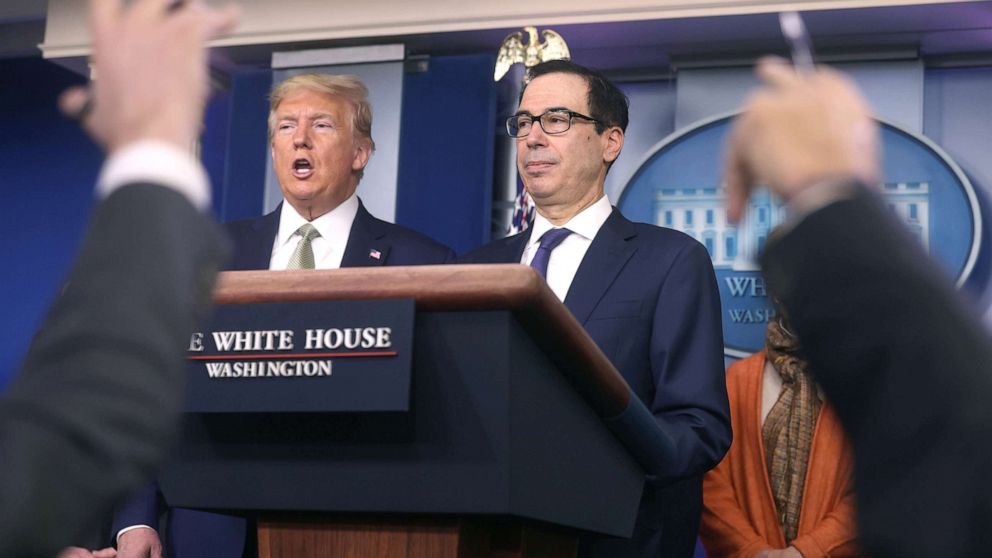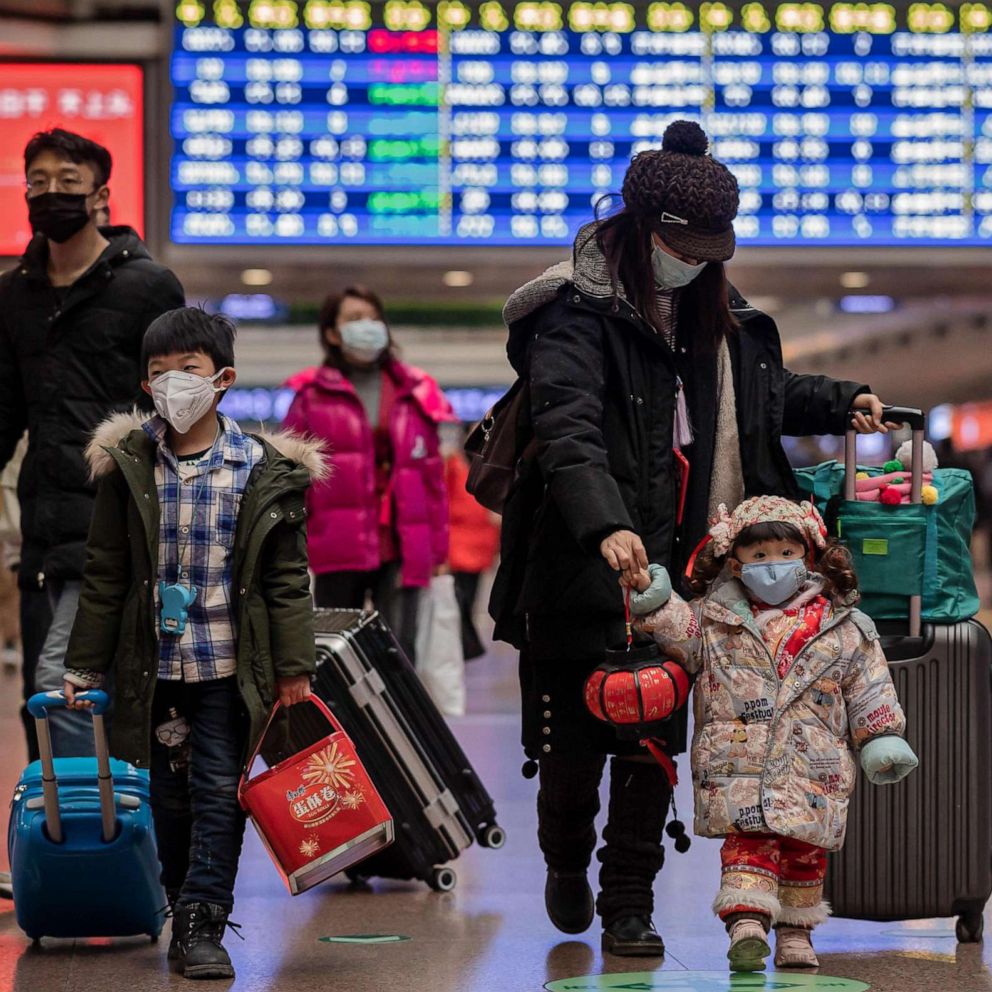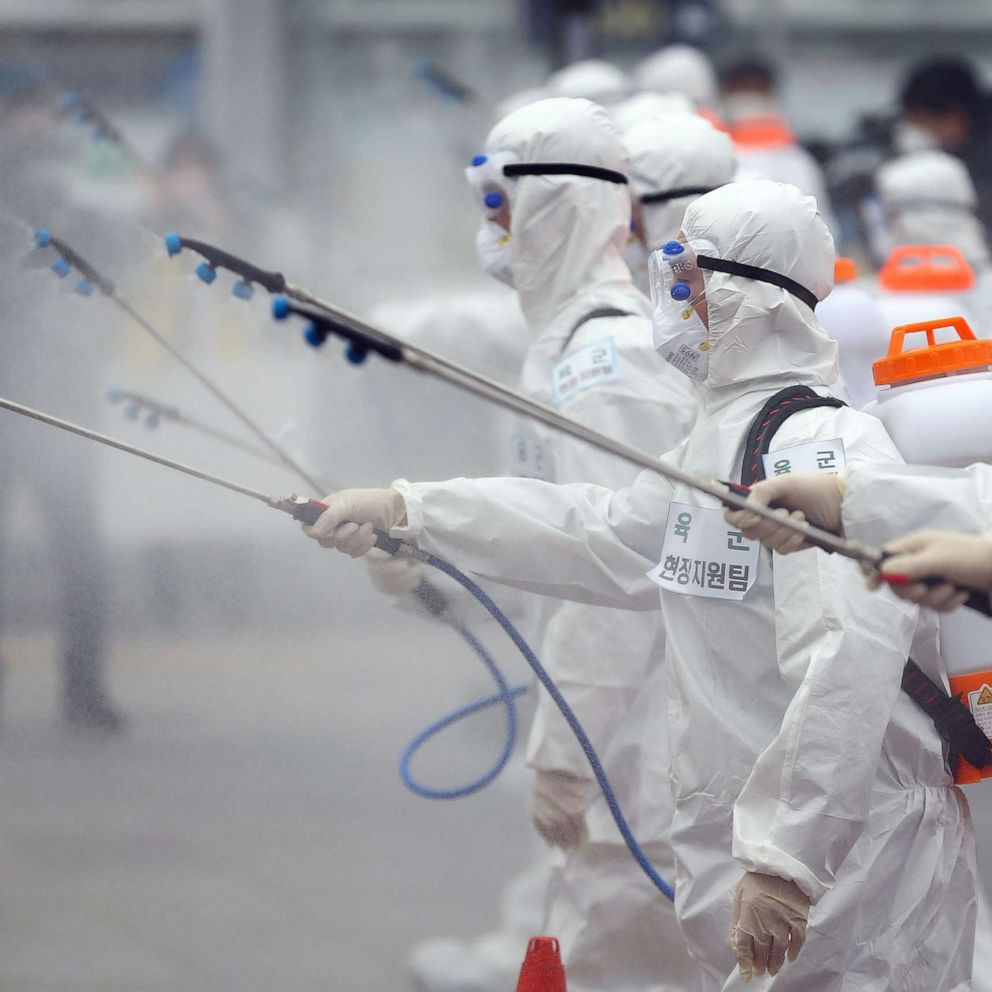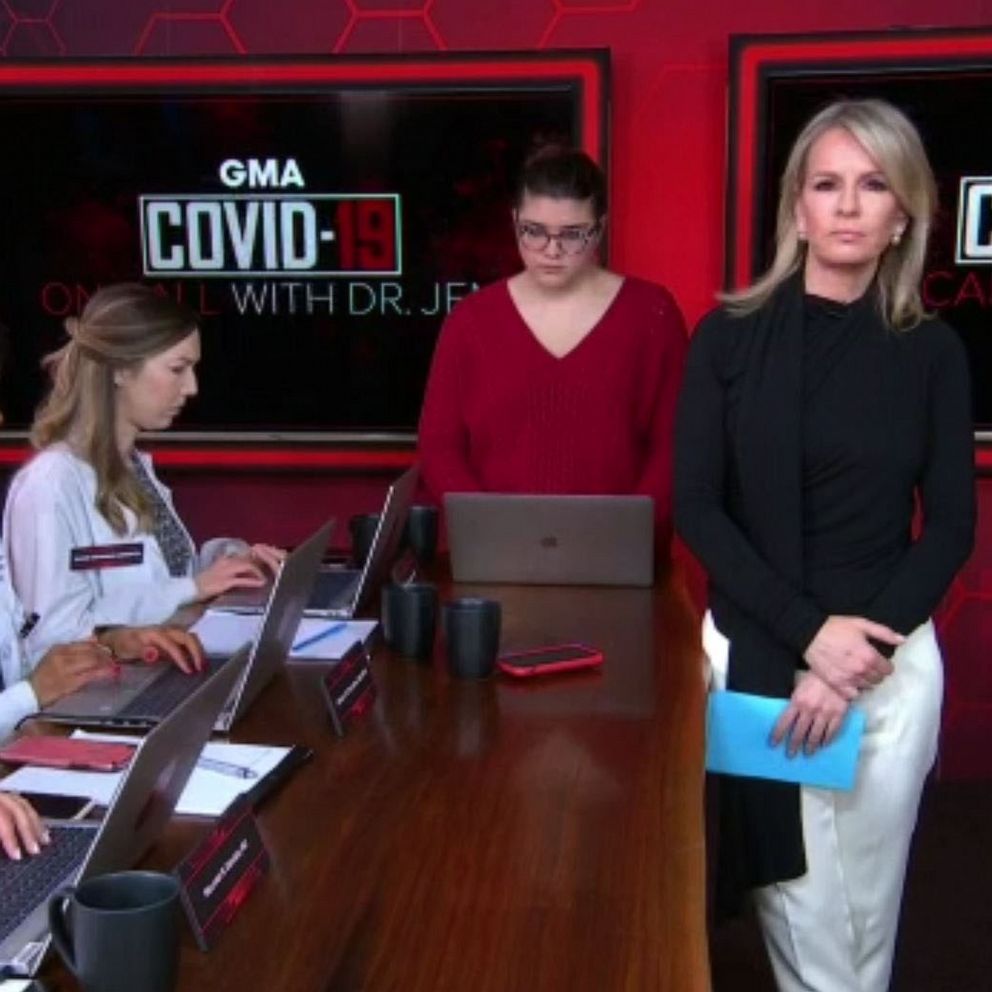Trump now calling coronavirus fight a 'war' with an 'invisible enemy'
President Donald Trump, one day after recommending new health and social guidelines to slow the spread of COVID-19, on Tuesday proposed ways to deal with the growing economic harm the crisis is having on business and Americans workers.
Referring the virus as the "enemy" and the fight as a "war," Trump said, "One day we'll be standing up here and say, 'Well, we won.' And we're going to say that, as sure as you're sitting there, we're going to win. And I think we're going to win faster than people think, I hope," adding,"If we do this right, our country -- and the world, frankly -- but our country can be rolling again pretty quickly. Pretty quickly."
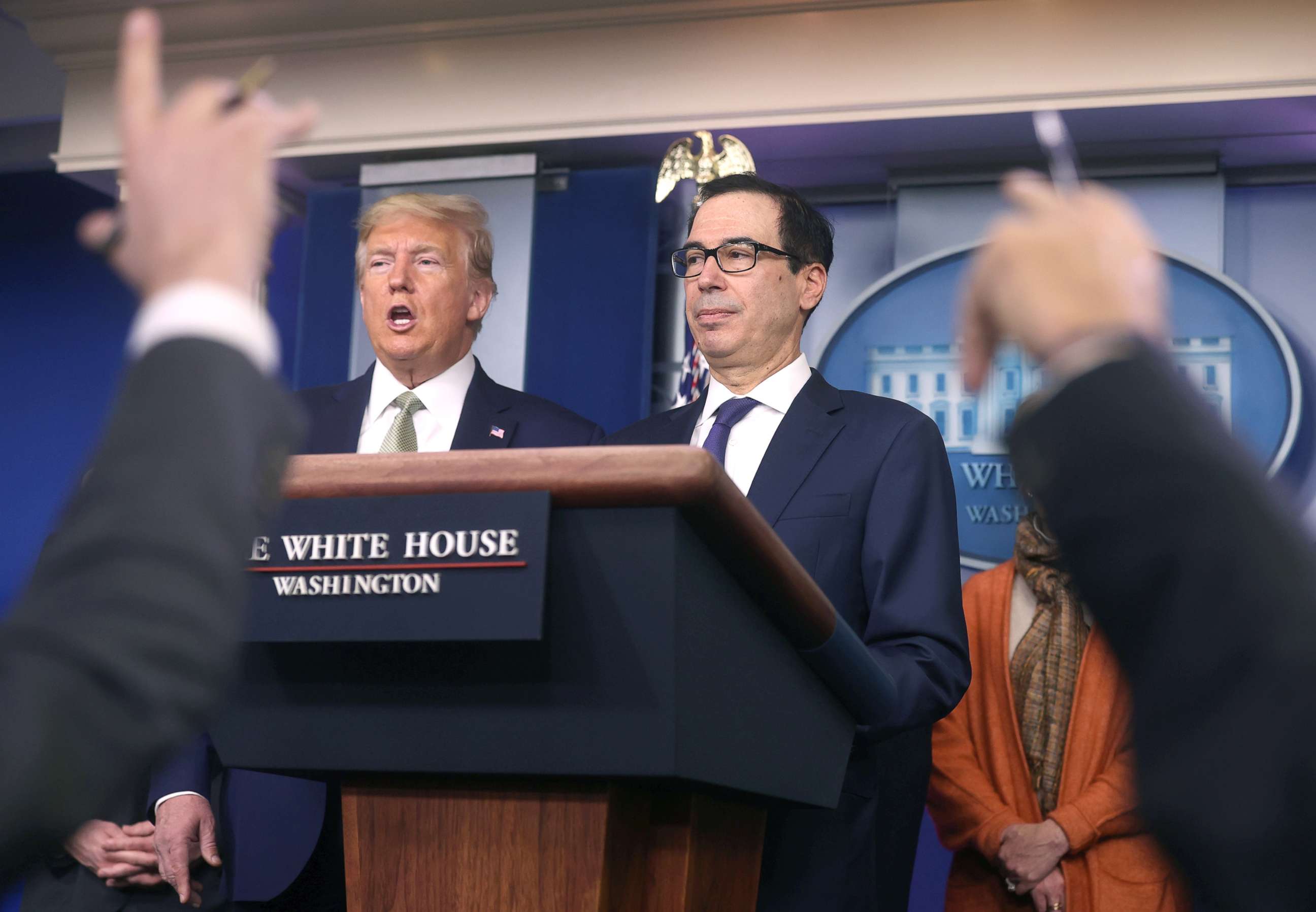
Treasury Secretary Steven Mnuchin and Trump -- acknowledging that a recession is imminent if not already occurring -- announced they support sending checks directly to Americans households that are hurting -- possibly within the next two weeks.
"We are looking at sending checks to Americans immediately. What we heard from hard working Americans, many companies are now shut down whether bars or restaurants, Americans gave cash now and the president wants to get cash now. I mean now -- in the next two weeks," Mnuchin said.
Tune into ABC News Live at 1 p.m. EDT every weekday for the latest news, context and analysis on the novel coronavirus, with the full ABC News team where we will try to answer your questions about the virus.
"I think we are going to do something that gets money as quickly as possible" into the hands of Americans," Trump added, emphasizing that he doesn't want a patchwork of economic relief measures, saying his administration is "going big" in what it's proposing to Congress.
Though they did not offer additional details on how the measures, including the checks to Americans, might work, the move signals the administration is backing away from the payroll tax cut it originally advocated for and is now looking at a different set of measures to aid affected industries and individuals.
Trump said that his administration was also preparing to ask Congress to infuse roughly $850 billion in additional stimulus to prop up the economy.
But following the briefing, several senators told ABC News that they’re discussing $1 trillion as the top-line number -- not $850 billion -- with conservative South Dakota Sen. Mike Rounds, saying, "It may go over one trillion."
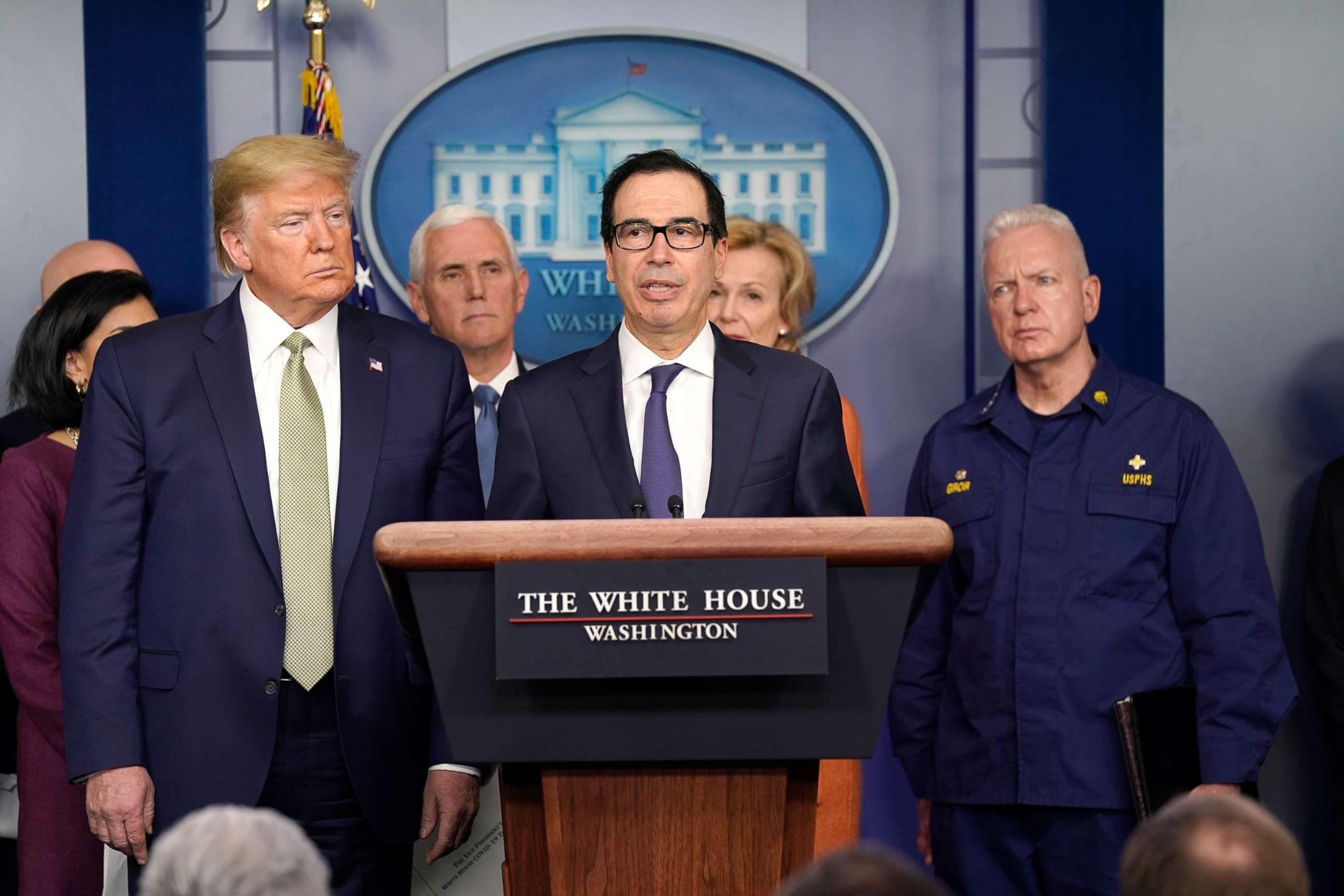
"With this invisible enemy, we don't want airlines going out of business, we don't want people losing their jobs and not having money to live when they were doing well four weeks ago," the president said.
Speaking on low-wage workers, he added, “They work very hard, but they work on tips. We have to take care of our people. We don't want to have people suffering during this period. It wasn't their fault that this thing all of a sudden was upon us.”
He shared similar thoughts on New York state and the airline industry, saying the pandemic is not their faults but that the federal must now take care of them.
“New York has a pretty big problem. I guess, would be, the number one hot spot. That's no fault of anybody's, it's just the way it is, but we're working very closely together," Trump said, noting he had a "productive" call with New York Gov. Andrew Cuomo this morning after days of political infighting between the two.
“We're also looking to help companies such as the airlines," Trump said, repeating his earlier sentiment. "This is not their fault. And they've been very understanding, actually, and we're going to be helping them.”
Mnuchin made a point to say there's every intention to keep the markets open, though he floated the possibility of shortening market operating hours if that was deemed necessary, and he distanced the current situation with the market closure after 9/11.
"We absolutely believe in keeping the markets open. Americans need to know they have access to their money," Mnuchin said. "After Sept. 11, the only reason why the markets were closed was because the technology was disrupted."
"We may get to a point where we shorten the hours if that's something they need to do, but Americans should know that we are going to do everything to make sure that they have access to their money at their banks, to the money in their 401ks and to the money in stocks."
The Federal Reserve has also said it will create a lending vehicle to stabilize the commercial-paper market, with the Treasury Department providing $10 billion for that fund, but ABC News Chief Business, Economics and Technology Correspondent Rebecca Jarvis noted the damage already done.
"The market has still felt a great deal of pain," Jarvis said after the White House briefing. "We very likely are already in a recession and it will take much more to curtail a recession than thousand dollar payments to those who are out of work. This is a problem that will continue to have a ripple effect."
Trump and top officials also urged Americans not to hoard supplies or seek non-urgent medical care as the health care system expects exponential growth of cases in the coming weeks.
"We're trying to get people to buy less if that's possible, buy less. Don't take everything, just buy what you need for awhile," Trump said, attempting to assure the public that grocery stores will "stay open at all hours of the day."
The shift in tone from the Trump administration comes as Ambassador Dr. Deborah Birx -- the White House's point person on the coronavirus -- revealed a new model from the Imperial London College has predicted up to 2.2 million Americans could die if action isn't taken to stop the spread.

"We looked at many different models," Trump said, "and the model we have is, we want to save a lot of lives. If we get too steep in that curve, we'll lose a lot of lives."
Dr. Anthony Fauci, the nation's leading expert on infectious diseases, took a moment to urge young people especially to avoid public gatherings.
"Don't get the attitude, 'Well, I am young, I am less vulnerable,'" he cautioned. "What you may do -- and you don't want to do -- is you don't want to put your loved ones at risk, the ones who are elderly, and the one who have compromised conditions. We can't do this without the young people cooperating. Please cooperate with us."
When a reporter noted to Fauci that New York Gov. Andrew Cuomo has said the peak of the virus will hit in roughly 45 days, Fauci said that while "45 days does not seem unreasonable," he cautioned not to get married to a number.
"It will probably be several weeks and maybe longer until we know we're having an effect," he said, candidly explaining the curve must be studied in a broader context. "I would not put us to test every single day, 'wait a minute, it is going up and is it working?' That would be misleading, if we are doing that."
Fauci added that "when you have input into the kind of mitigations and things that we're doing, we're going to see a hump instead of a peak."
Trump announced in the briefing that that FDA has granted all states the ability to approve tests developed in laboratories in the states and that all tele-health services will be covered under Medicare.
He also said the Army Corps of Engineers is 'ready, willing, and able' to launch temporary medical facilities, if needed.
Vice President Mike Pence called on construction companies to donate N95 masks in order to address shortages.
"We would make one request. We would urge construction companies to donate their N95 masks to your local hospital and forgo additional orders of those industrial masks," he said.
After weeks of criticism on the government's lag in testing, Adm. Brett Giroir, the Department of Health and Human Services' assistant secretary of health and point person on the job, gave a numbers update. He said the Centers for Disease Control and Prevention and public health labs have reported 31,878 tests conducted, while clinical labs have reported about 27,000 tests conducted.
He also said he expects, over the next few days, to begin setting up 47 drive-thru testing facilities in approximately 12 states.
When Trump was again whether he was considering imposing domestic travel restrictions, he said,"It's possible. We'll see how it goes."
The president also defended his use of the term "Chinese virus" as "very accurate," saying he started using that phrase in reaction to China spreading disinformation that the U.S. military was behind the virus.
"I did not appreciate the fact that China was saying our military gave it to them. Our military did not give it to anybody," Trump said.
He pushed back against the idea that using the term creates a stigma, saying, "I don't think so. I think saying that our military gave it to them creates a stigma."
The president insisted that he does "want to be bipartisan" and even said "nobody is going to be better than me" but explained that that call for bipartisanship really only stands so long as Democrats do not criticize him or the federal government's response.
When questioned by ABC News Chief White House Correspondent Jonathan Karl about his continued attacks on Democrats, in spite of his call in his national address last week to put politics aside, Trump defended his attacks as self-defense.
"When they attack me ... I'm not going to let them get away with it, I can't do that," Trump said.
What to know about coronavirus:
- How it started and how to protect yourself: coronavirus explained
- What to do if you have symptoms: coronavirus symptoms
- Tracking the spread in the US and Worldwide: coronavirus map
ABC News' Jordyn Phelps, Ben Gittleson, Jonathan Karl and Rebecca Jarvis contributed to this report.
